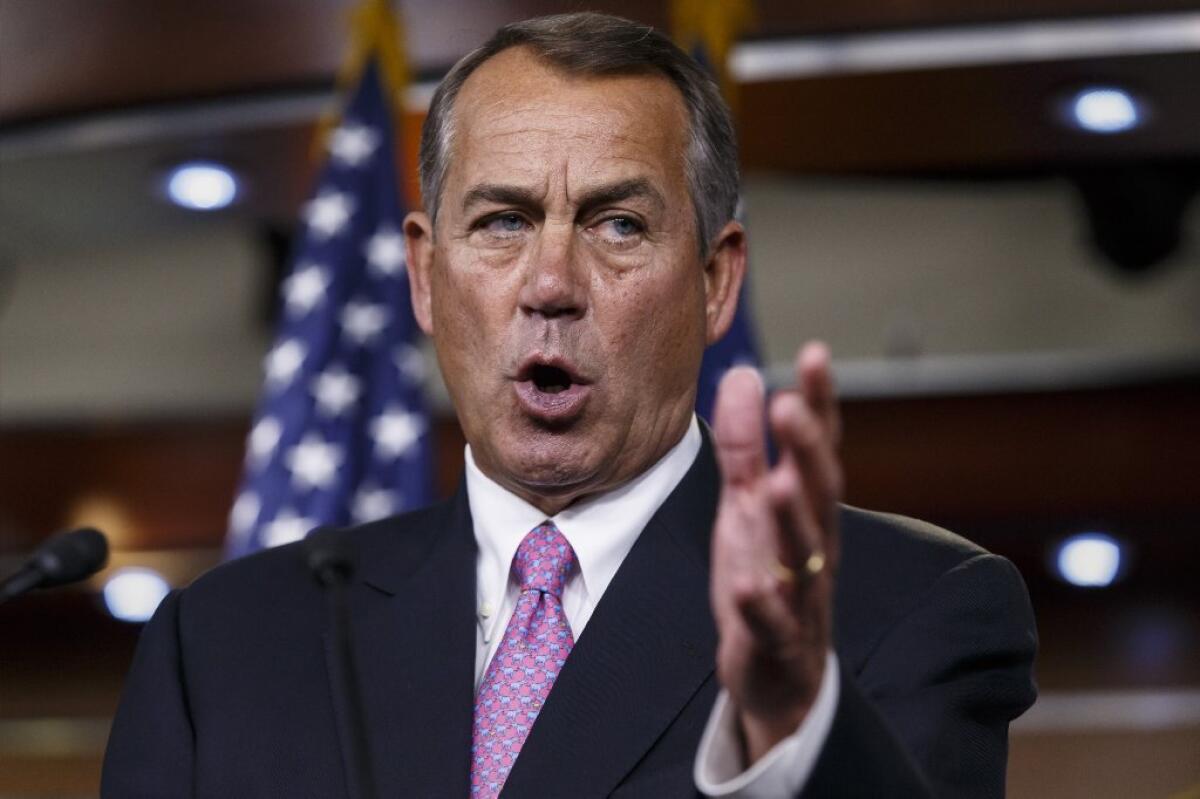Subject to debate: Do the Obamacare delays break the law?

- Share via
No one would claim that implementation of the Affordable Care Act has been especially smooth.
The technical problems of the federal enrollment website, HealthCare.gov, last October and November, were only part of it: The administration has repeatedly postponed deadlines for a raft of major mandates in the law, including requirements that employers provide health coverage for their workers and that insurers bring substandard health plans into compliance (the “like it, keep it” fix).
With every delay comes a chorus from Obamacare opponents that the president is acting “illegally.” The New England Journal of Medicine has now weighed in with analyses by legal experts on both sides of the issue. Their discussion should clear the air.
That’s important, because Republicans hit this “lawlessness” theme like a broken record -- Politico recently listed 15 reprises involving Obamacare and other laws. House Speaker John A. Boehner even used it as a rationale for not moving ahead on immigration reform, arguing that Obama couldn’t be trusted to implement it lawfully. (That’s one way to justify killing a law you don’t want to pass in the first place.)
So let’s strip away the partisan rhetoric and see what the rules say.
The first New England Journal of Medicine essay comes from Nicholas Bagley of the University of Michigan law school. Bagley concludes that some of the Affordable Care Act delays may in fact step over the line, or at least create a “troubling precedent.” Bagley’s not more dogmatic because, as he wrote, “no crisp line separates routine nonenforcement from blatant disregard.”
Here’s a chart of the major delays, reprinted from Bagley’s essay:
It’s not unusual, or illegal, for the government to suspend or moderate enforcement of some laws in order to husband its resources for more important duties, Bagley observed. The delay of the employer mandates, moreover, correspond to established practice by the IRS, dating back decades, of granting “transition relief” to taxpayers subject to changes in tax laws, as these are. Congress hasn’t objected in the past. That said, Bagley pointed out that such relief is usually granted for just a few months at a time, and not for major provisions.
Bagley was less tolerant of the delays allowing old, canceled policies to remain temporarily in force. That was a political maneuver, he observed, aimed at validating the president’s promise that “if you like your old plan, you can keep it.” That “probably exceeds” the limits of presidential authority, he said.
On the other side of the debate are Timothy S. Jost of Washington and Lee University Law School and Simon Lazurus of the Constitutional Accountability Center in Washington. They argue that all the delays easily fit within the standard of “lawful discretion” set by a 1985 Supreme Court ruling, which gave the executive branch latitude to make its own judgments about enforcement unless they were “so extreme” that they amounted to “abdication of its statutory responsibilities.”
They also note that it’s not at all unusual for a president to waive provisions of especially complicated new government programs to give their subjects or beneficiaries time to respond. George W. Bush did it with Medicare Part D, the prescription drug program -- indeed, as Kevin Drum observed, Bush not only waived the penalties for late enrollment for nearly a year, he took credit for the move, announcing it personally as a boon for seniors.
Interestingly, Bagley and Jost/Lazarus agree on two major points. One is that even if Obama has stepped over the line of legality, there’s nothing anyone can do about it: No one has standing to sue Obama in court to force the mandates to be observed. Bagley, however, warned that Obama’s actions might provide precedent for a future administration to decline to enforce parts of the Affordable Care Act it doesn’t like, including those “essential to the proper functioning of the law.” His point is that Obama may be sowing the seeds of his own law’s destruction.
The other point on which they agree is that much of the blame for the necessity of the delays belongs to Republicans in Congress. That’s because the GOP has refused to help fix the implementation issues legislatively.
Bagley cited the “toxic and highly polarized political environment,” observing that “Congress’s unwillingness to work constructively with the White House to tweak the ACA has increased the pressure on the administration to move assertively.” Jost and Lazarus wrote that some deadlines have had to slip because Congress has refused to appropriate funds to implement the law since its passage in 2010.
One issue that neither side addressed in their exchange in the medical journal is worth pondering. All of the delays granted by the White House serve purposes the GOP has demanded. The Republicans have complained about the burden of the employer mandates; the administration has delayed them for as long as two years. The Republicans raised hell about the cancellations of existing policies; the administration encouraged state officials to let them remain in place for up to an additional two years. (Though some states kept to the old deadline of Jan. 1, 2014.)
This points again to one of the longstanding riddles about the Affordable Care Act and healthcare reform: What is it that the Republicans want, and what’s their plan for getting there? If their only proposal is to repeal the law, not fix it, then they’re effectively leaving the options for making it work to the White House and they have no right to complain when that happens.
More to Read
Sign up for Essential California
The most important California stories and recommendations in your inbox every morning.
You may occasionally receive promotional content from the Los Angeles Times.











